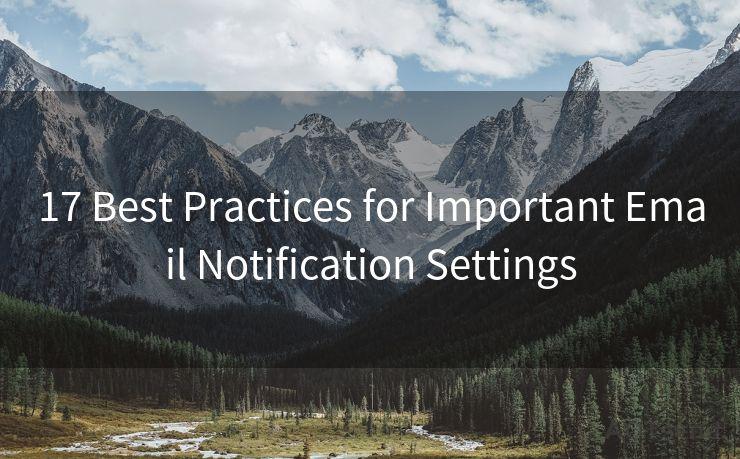17 Best Practices for Important Email Notification Settings




Email notifications are crucial for keeping users informed and engaged. However, setting up effective email notifications is an art that requires careful consideration. In this blog post, we'll explore 17 best practices for configuring important email notification settings to ensure maximum effectiveness and user satisfaction.
1. Define Clear Goals
Before implementing email notifications, define clear goals. Are you aiming to increase user engagement, drive conversions, or provide critical updates? Clear goals will help you craft targeted and relevant notifications.
2. Segment Your Audience
Not all users want or need the same information. Segment your audience based on their preferences, demographics, or behavior to send more personalized notifications.
3. Use Compelling Subject Lines
The subject line is the first thing users see. Make it compelling and relevant to increase open rates.
4. Keep Content Brief and Actionable
Long emails are often ignored. Keep your notifications brief, to the point, and include a clear call to action.
5. Optimize for Mobile
Most emails are now opened on mobile devices. Ensure your notifications are mobile-friendly with responsive design.
6. Test and Optimize
Regularly test your email notifications to see what works best for your audience. Use A/B testing to compare different subject lines, content, and calls to action.
7. Avoid Spam Filters
Familiarize yourself with common spam trigger words and avoid using them in your notifications to prevent emails from being marked as spam.
8. Use Plain Text and HTML Versions
Provide both plain text and HTML versions of your notifications to ensure compatibility with various email clients and user preferences.
9. Include Unsubscribe Options
Respect user privacy and preferences by providing an easy way to unsubscribe from notifications.
10. Time Your Notifications
Consider the best time to send notifications based on your audience's timezone and daily routines.
11. Personalize Content
Use merge tags to personalize email content with the user's name, location, or other relevant information.
12. Track and Analyze Performance
Use analytics tools to track open rates, click-through rates, and conversions to measure the effectiveness of your notifications.
13. Ensure CAN-SPAM Compliance

Follow CAN-SPAM regulations, including clear identification of the sender, a valid physical address, and an opt-out option.
14. Avoid Overwhelming Users
Too many notifications can be annoying. Strike a balance between keeping users informed and not overwhelming them.
15. Use Clear and Consistent Branding
Maintain a consistent brand voice, design, and tone in your notifications to build trust and familiarity.
16. Provide Value in Every Notification
🔔🔔🔔
【AOTsend Email API】:AOTsend is a Managed Email Service for sending transactional emails. Support Email Types: reminders, authentication, confirmations, notifications, verification codes, invoices, password resets, account activations, billing statements, two-factor authentication (2FA), and one-time passwords (OTP) emails, etc. $0.28 per 1000 Emails. 99% Delivery, 98% Inbox Rate.
You might be interested in:
Why did we start the AOTsend project, Brand Story?
What is a Managed Email API, How it Works?
Best 25+ Email Marketing Platforms (Authority,Keywords&Traffic Comparison)
Best 24+ Email Marketing Service (Price, Pros&Cons Comparison)
Email APIs vs SMTP: How they Works, Any Difference?
Each email should provide value to the user, whether it's a discount, an update, or useful information.
17. Continuously Iterate and Improve
Email marketing is an ongoing process. Continuously collect feedback, analyze data, and iterate on your notification strategy to improve results.
By following these 17 best practices for important email notification settings, you can ensure that your notifications are effective, engaging, and provide value to your users. Remember, email notifications are a powerful tool for building relationships and driving action, so use them wisely.




Scan the QR code to access on your mobile device.
Copyright notice: This article is published by AotSend. Reproduction requires attribution.
Article Link:https://www.mailwot.com/p4337.html



